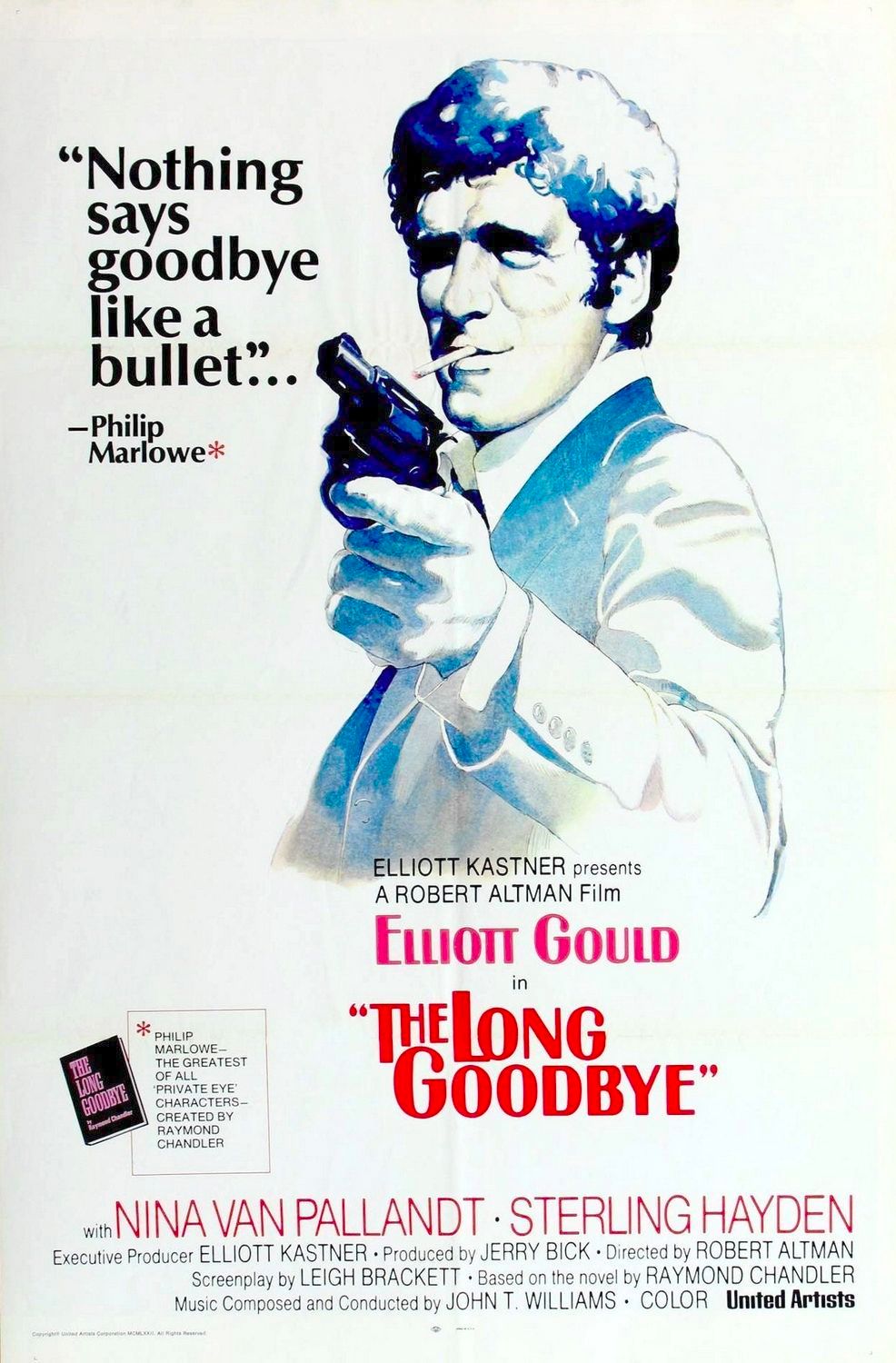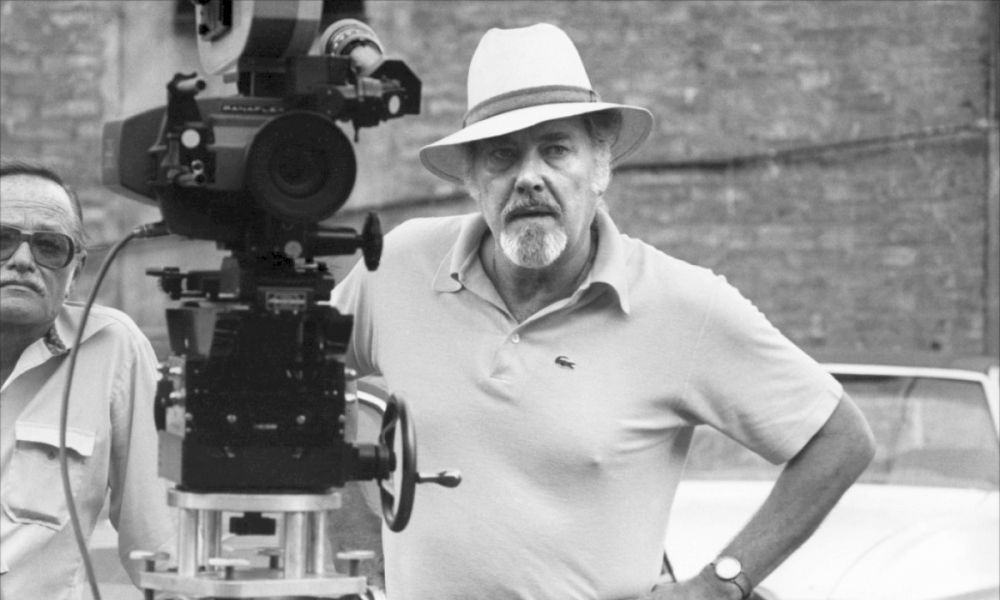"The undeniable brilliance of Altman's cinema is most closely tied to a simple point made in each of his greatest works: the tapestry of overlapping lives is richer than overproduced spectacle. Witness Nashville, The Player, Short Cuts, or Gosford Park: each film lets characters complicate events by their unique personality traits rather than showcases special-effects technicians and pyrotechnics." - Garrett Chaffin-Quiray (501 Movie Directors, 2007)
Robert Altman
Director / Producer / Screenwriter
(1925-2006) Born February 20, Kansas City, Missouri, USA
Top 250 Directors
(1925-2006) Born February 20, Kansas City, Missouri, USA
Top 250 Directors
Key Production Countries: USA, UK
Key Genres: Drama, Comedy, Ensemble Film, Satire, Comedy Drama, Crime, Thriller, Romance, Mystery, Dark Comedy, LGBT-Related Film, Mystery-Suspense
Key Collaborators: Stephen Altman (Production Designer), Pierre Mignot (Cinematographer), Geraldine Peroni (Editor), Shelley Duvall (Leading Character Actress), Michael Murphy (Character Actor), Paul Dooley (Character Actor), Dennis M. Hill (Editor), Lou Lombardo (Editor), Rene Auberjonois (Character Actor), Elliott Gould (Character Actor), Frank Barhydt (Screenwriter), Jean Lépine (Cinematographer)
Key Genres: Drama, Comedy, Ensemble Film, Satire, Comedy Drama, Crime, Thriller, Romance, Mystery, Dark Comedy, LGBT-Related Film, Mystery-Suspense
Key Collaborators: Stephen Altman (Production Designer), Pierre Mignot (Cinematographer), Geraldine Peroni (Editor), Shelley Duvall (Leading Character Actress), Michael Murphy (Character Actor), Paul Dooley (Character Actor), Dennis M. Hill (Editor), Lou Lombardo (Editor), Rene Auberjonois (Character Actor), Elliott Gould (Character Actor), Frank Barhydt (Screenwriter), Jean Lépine (Cinematographer)
"Altman’s anti-aesthetics is anti-Hollywood, and he follows instead in the line of Rossellini, de Sica, Fellini, and Bergman. There are of course enormous differences between these European directors and Altman. Although the carnivalesque bustling of many Altman films can recall only Fellini, the two directors’ attitudes toward sound design, for instance, is completely antithetical. Every sound in Fellini is dubbed in postproduction, often quite noticeably, whereas almost everything in Altman is recorded on the spot, including his trademark overlapping dialogue." - Steven Dillon (The Solaris Effect: Art & Artifice in Contemporary American Film, 2006)
"Robert Altman is American cinema's greatest iconoclast. Prolific, experimental, visionary and ambitious, he is a director whose career spans over five decades and includes over thirty feature films. Known as a maverick director (a label he denies), Altman eschews the market-oriented climate of Hollywood, refusing to bow to studio demands and insisting on total control over his material. The result is an eclectic body of work that moves across several genres, each picture effectively dismantling the generic conventions on which it draws." - Tanya Horeck (Contemporary North American Film Directors, 2002)

Nashville (1975)
"Altman's use of multi-track sound is also incredibly complex: sounds are layered upon one another, often emanating from different speakers in such a way that the audience member must also decide what to listen for. Indeed, watching and listening to an Altman film inevitably requires an active participant: events unroll with a Bazinian ambiguity. Altman's Korean War comedy M*A*S*H was the director's first public success with this kind of soundtrack." - Charles Derry (International Dictionary of Films and Filmmakers, 1991)
"His refusal to tell straightforward stories, his apparent improvisation of script, his casting unusual actors and stars against type, his restless and obliquely motivated zoom shots, his multiply layered soundtracks – such qualities have regularly been seen as significant innovations in Hollywood story and style or as quirky irritations." - Robert Self (Senses of Cinema, 2005)
"Altman is usually happier with large casts than small: while elegantly shot and acted, the intimate theatrical adaptations he was reduced to making in the 80s (he's always been an outsider in Hollywood) lack the social, historical and philosophical import of McCabe & Mrs. Miller, Nashville, the made-for-TV Tanner '88, The Player and Short Cuts - movies which confirm him, however erratic his output, as one of the greatest - and most stylistically innovative - filmmakers of the modern era." - Geoff Andrew (The Director's Vision, 1999)
"Altman’s legacy is still being determined, in part because of the size and variety of his oeuvre. Although collaboration was crucial to his work, he remained an individual and idiosyncratic director. He loved classical Hollywood filmmaking even as he delighted in satirizing the industry and its history, turning increasingly to European cinema (Fellini, Renoir, Bergman) for inspiration. His disregard for storytelling kept him at the margins of the film industry, even as his love for actors, and their love for him, meant that he was able to work with almost every major star of the past fifty years. If he disdained narrative, he loved situations, using plot more as a way of throwing his characters together in various combinations rather than as a unifying thread. With his combined love of and derision for tradition, his assertions of individuality together with his need for community, his mixture of high and low, and his alternations between delicacy and crassness, Altman seems a uniquely American figure." - David Pendleton (Harvard Film Archive, 2015)
"Irreverent, iconoclastic director whose films have won kudos from critics and film buffs for decades, though his box-office hits have been few and far between. His career has had more than its share ups and downs, but Altman has "never sold out", remaining a maverick at every turn." - Leonard Maltin's Movie Encyclopedia, 1995
"Unusual by American standards, he has refused to make formula pictures, trying to so something different with each film. Nevertheless, they are all shot in the rectangular-shaped Panavision. He also likes to use the same actors and technicians from film to film, often getting his performers to write or improvise their own dialogue." - Ronald Bergan (A-Z of Movie Directors, 1983)
"The director proffers an elliptical, poignant, often bitingly satirical vision of American sensibilities." - William R. Meyer (The Film Buff's Catalog, 1978)
“A director/producer whose work arouses deep passions among filmgoers, Robert Altman stirs his audiences to either love or hate his films. Those who love Altman's work perceive a courageous individualist who disdains the usual requirements of form and structure and, instead, makes movies that meander meaningfully toward a striking intellectual honesty. Those who abhor Altman's films see him as a self-indulgent moviemaker who has rarely been able to tell a story with a discernible beginning, middle, and end. And even his best works, his critics would contend, often lack any emotional punch.” - The Encyclopedia of Hollywood, 2004
"Unfortunately, audiences are not very adventurous; too much has been delivered to them. In other words, they make these things too easy to follow. They don’t demand that you become involved. If you read a novel and don’t involve yourself in it, skim it, you’d say, “That’s nothing.” Because it’s a kind of art that demands your attention, and unfortunately we’ve made such “instant candy” out of film that the audience goes, “Oh that’s good, give me one of those.” They eat it, and all that stays is the sugar in their system and they forget about the movie immediately." - Robert Altman (BOMB Magazine, 1999)
Selected Filmography
{{row.titlelong}}
GF Greatest Films ranking (★ Top 1000 ● Top 2500)
21C 21st Century ranking (☆ Top 1000)
T TSPDT N 1,000 Noir Films
R Jonathan Rosenbaum S Martin Scorsese
21C 21st Century ranking (☆ Top 1000)
T TSPDT N 1,000 Noir Films
R Jonathan Rosenbaum S Martin Scorsese
Robert Altman / Favourite Films
Brief Encounter (1945) David Lean, Persona (1966) Ingmar Bergman.
Source: You Gotta See This (2007)
Brief Encounter (1945) David Lean, Persona (1966) Ingmar Bergman.
Source: You Gotta See This (2007)
Robert Altman / Fan Club
Armond White, Richard Combs, Neil Young, John Cameron Mitchell, Michel Ciment, Martin Scorsese, David Ansen, Ricardo Luis Alvarez, Roger Ebert, Ed Gonzalez, Jim Emerson, Bruce LaBruce.
Armond White, Richard Combs, Neil Young, John Cameron Mitchell, Michel Ciment, Martin Scorsese, David Ansen, Ricardo Luis Alvarez, Roger Ebert, Ed Gonzalez, Jim Emerson, Bruce LaBruce.
"Fan Club"
These film critics/filmmakers have, on multiple occasions, selected this director’s work within film ballots/lists that they have submitted.
These film critics/filmmakers have, on multiple occasions, selected this director’s work within film ballots/lists that they have submitted.


